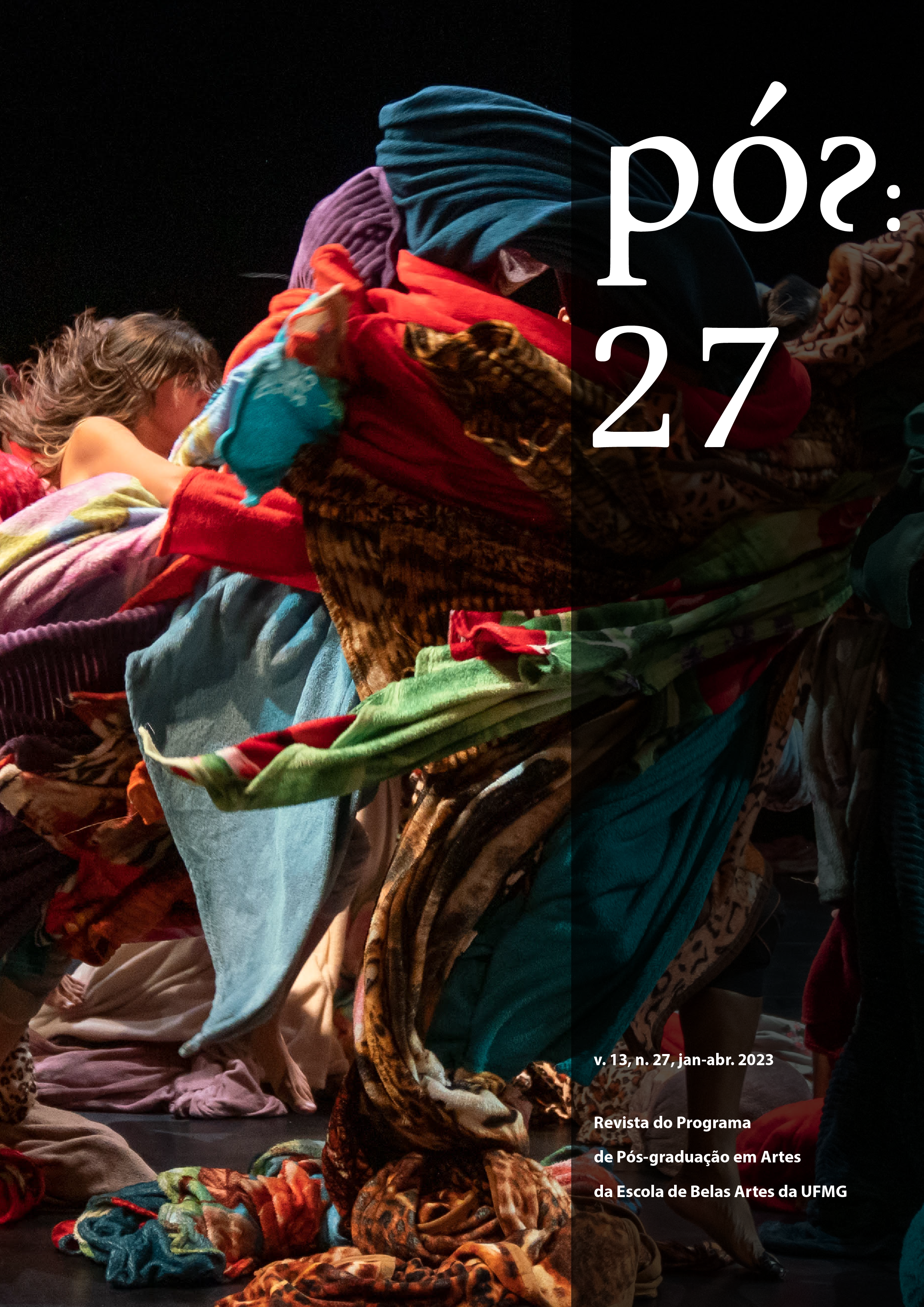Interrupting the spectacle
the political and aesthetical gesture of the emotions
DOI:
https://doi.org/10.35699/2237-5864.2023.41744Keywords:
Queer bodies, Emotions, Interruption, Political and aesthetical gesturesAbstract
This essay reflects on the emotions that circulate and mark the bodies from two fronts: the emotions imprinted in queer bodies that perform in the contemporary scene as provoking a transformative affective displacement of the subject and its symbolical conditioning; and how the images proposed on the stage by these bodies reorganize the historical sense of images, revoking emotions/directions and meanings, proposing new landscapes in its place with a critical view of reality. To think about the political and aesthetical gesture of bodies considered strange, subversive, and rebellious to social markers, in its transversality and transversatility is what we want to think of as an interruption device for the spectacle and its colonizing discourses.
Downloads
References
AHMED, Sara. La política cultural de las emociones. México: Centro de Investigaciones y Estudios de Género UNAM, 2015.
AVENDAÑO, Lukas. Barcelona. 4 jul. 2018. 1 vídeo (28 min.). Disponível em: https://www.youtube.com//watch?v=UejJeyPEbaM. Acesso em: 10 out. 2021.
AVENDAÑO, Lukas. Réquiem para un Alcaraván. Canadá, 2015. 1 vídeo (86 min.). Disponível em: https://vimeo.com/152631668. Acesso em: 10 out. 2021.
BUTLER, Judith. Corpos que pesam: sobre os limites discursivos do “sexo”. In: LOURO, Guacira Lopes. O corpo educado: pedagogias da sexualidade. Belo Horizonte: Autêntica, 2001. p. 110-125.
BOURDIEU, Pierre. A dominação masculina. Rio de Janeiro: Bertrand Brasil, 2012.
CUSICANQUI, Silvia Rivera. Ch'ixinakax Utxiwa: una reflexión sobre prácticas y discursos descolonizados. Buenos Aires: Tinta Limón, 2010.
DEZ ARTISTAS queer falam sobre a origem de suas inspirações. Goianinha.org. Disponível em: https://goianinha.org/ultimas-noticias/dez-artistas-indigenas-queer-falam-sobre-a-origem-de-suas-inspiracoes/. Acesso em: 10 out. 2021.
DIDI-HUBERMAN, Georges. Que emoção! Que emoção? São Paulo: Editora 34, 2016.
GALINDO, Maria. Feminismo Bastardo. Madrid: Editorial Traficantes de sueños, 2021.
LARROSA, Jorge. Tremores: escritos sobre Experiência. Tradução: Cristina Antunes e João Wanderley Geraldi. Belo Horizonte: Autêntica, 2014.
RIBEIRO, Martha. Realismo Sedutor: o corpo-teatro e a invenção de realidades. São Paulo: Hucitec, 2022. (Coleção Licores).
RIBEIRO, Martha. A autoficção como tentativa de insurreição dos corpos ou o que aprendemos com Antonin Artaud: refazer o corpo, esculpir afetos. Revista Arte e Filosofia, v. 15, online, 2020. Edição especial. Disponível em: https://periodicos.ufop.br:8082/pp/index.php/raf/article/view/4191. Acesso em: 10 jan. 2021.
RIBEIRO, Martha. A escolha política de Medeia: um levante esquecido contra o Sistema de Representação Heterossexual (SRH). Pitágoras 500, Campinas, v. 11, n. 2, p. 49-63, 2021. Disponível em: https://periodicos.sbu.unicamp.br/ojs/index.php/pit500/article/view/8667109. Acesso em: out. 2021.
RIBEIRO, Martha. O corpo Biopotente: a decolonização dos afetos no, através e além do teatro. In: SIMPÓSIO INTERNACIONAL REFLEXÕES CÊNICAS CONTEMPORÂNEAS – LUME e PPG Artes da Cena. Anais […], n. 6, [s. l.: s. n.], 2021b. Disponível em: https://orion.nics.unicamp.br/index.php/simposiorfc/article/view/729. Acesso em: jul. 2021.
ROLNIK, Suely. Esferas da insurreição: notas para uma vida não cafetinada. São Paulo: N-1 edições, 2018.
Stambaugh, Antonio Prieto. “RepresentaXión” de un muxe: la identidad performática de Lukas Avendaño. Latin American Theatre Review, v. 48, n. 1, p. 31-53, 2014.
Downloads
Published
Issue
Section
License
Copyright (c) 2023 Martha Ribeiro

This work is licensed under a Creative Commons Attribution-NonCommercial 4.0 International License.
Authors who publish in this journal agree to the following terms:
- Authors retain copyright and grant the journal the right of first publication, with the work simultaneously licensed under the a Creative Commons Attribution-NonCommercial 4.0 International License that permits sharing of the work with acknowledgement of authorship and initial publication in this journal;
- Authors are permitted to enter into additional contracts separately, for non-exclusive distribution of the version of the work published in this journal (e.g., the Creative Commons Attribution License).
- Authors are permitted and encouraged to publish and distribute their work online (e.g., in institutional repositories or on their home page) at any point before or during the editorial process, as this may generate productive changes as well as increase the impact and citation of the published work.
- It is the responsibility of the authors to obtain written permission to use in their articles materials protected by copyright law. Revista PÓS is not responsible for copyright breaches made by its contributors.












